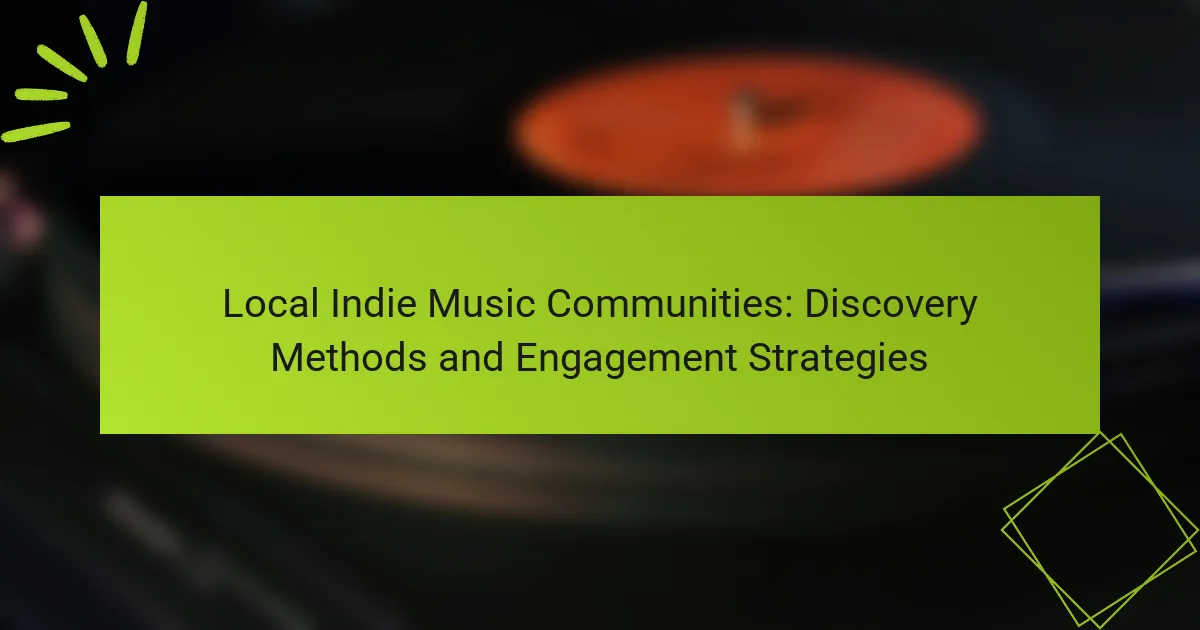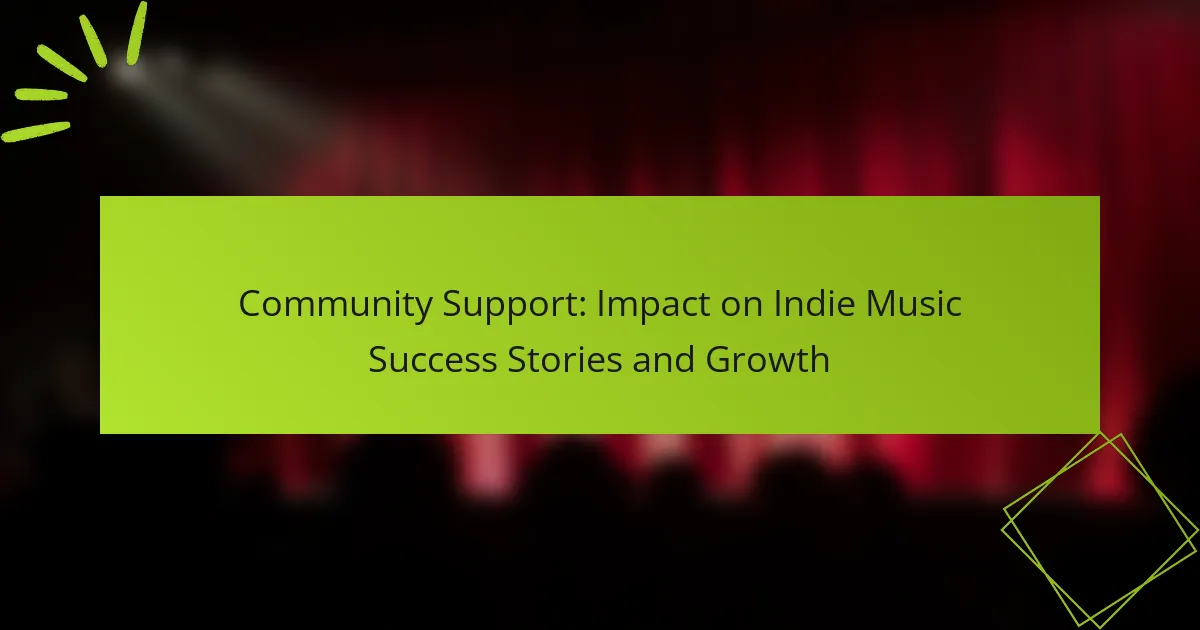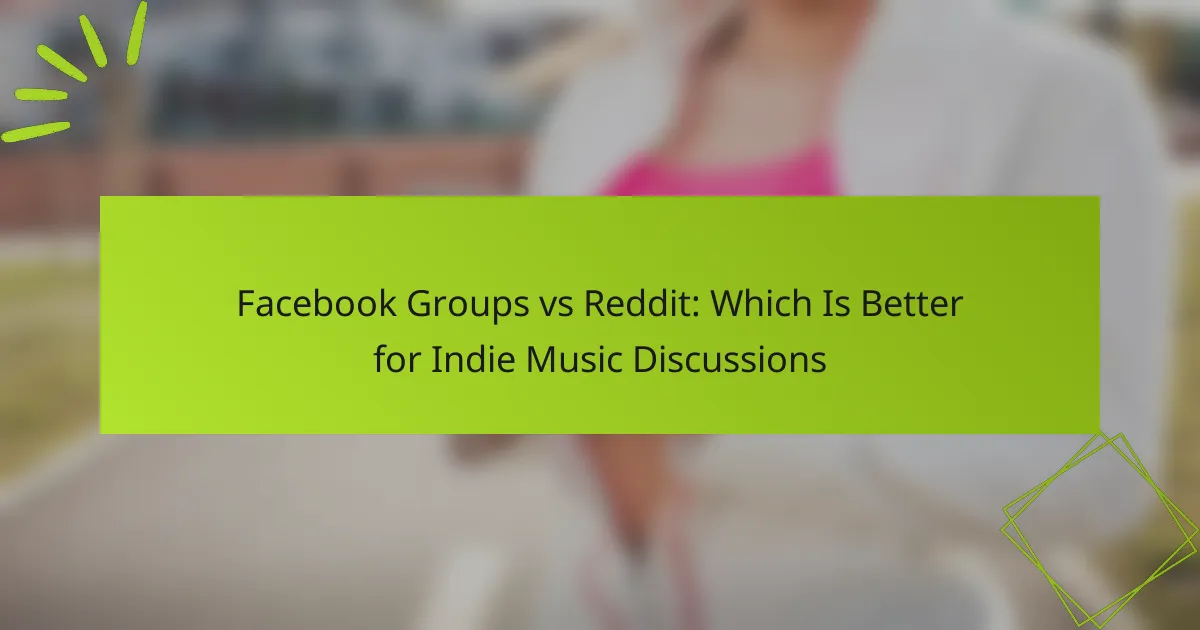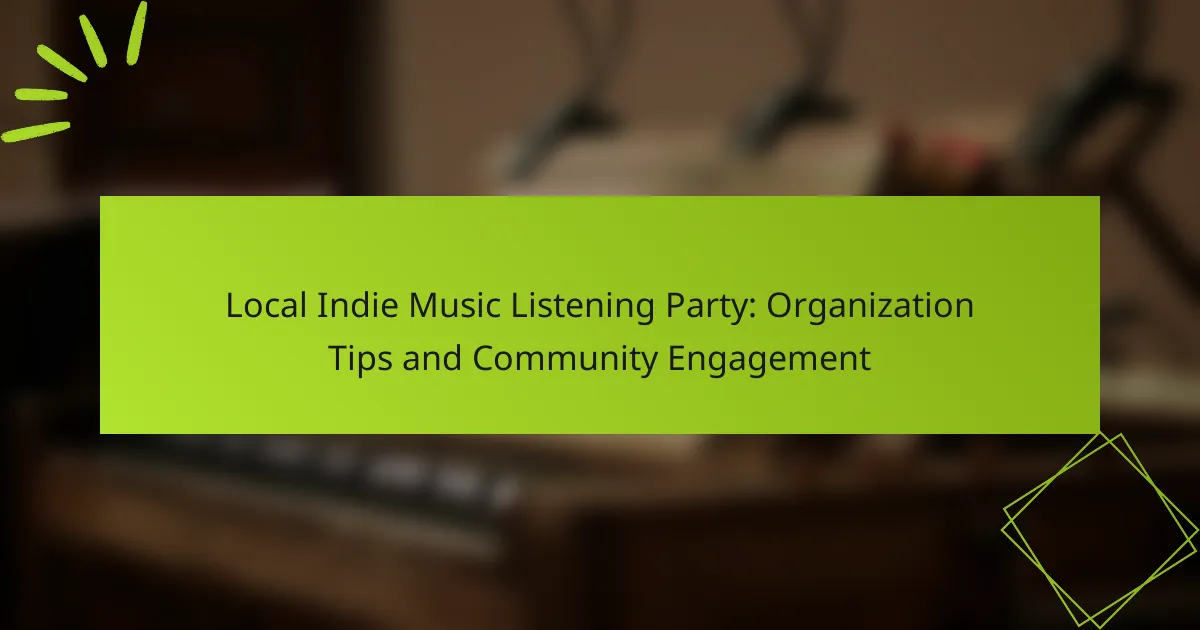Local indie music communities offer a rich tapestry of discovery and engagement opportunities for artists and fans alike. By utilizing social media, local blogs, and community events, individuals can connect with vibrant scenes and like-minded enthusiasts. Implementing collaborative events and fostering online discussions further enhances interaction, supporting local artists in gaining visibility and financial backing.
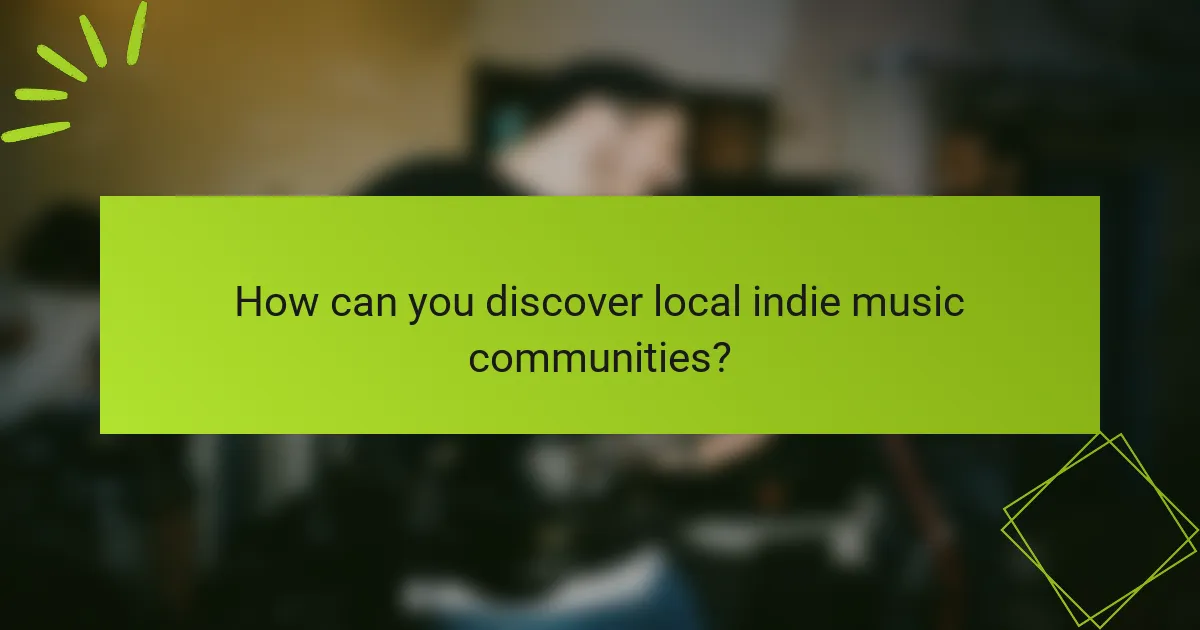
How can you discover local indie music communities?
Discovering local indie music communities involves leveraging various platforms and resources to connect with artists and fans. By exploring social media, local blogs, community events, and streaming services, you can find vibrant scenes and engage with like-minded individuals.
Social media platforms
Social media platforms like Facebook, Instagram, and Twitter are essential for discovering local indie music communities. Many artists and venues use these platforms to promote events, share music, and connect with fans. Joining local music groups or following hashtags related to your area can help you stay updated on new releases and performances.
Consider engaging with posts by liking, sharing, or commenting to foster connections. Look for local artists’ profiles and follow them to receive updates on their music and events.
Local music blogs
Local music blogs are valuable resources for discovering indie music scenes in your area. These blogs often feature reviews, interviews, and event listings that highlight emerging artists and local talent. Subscribing to a few reputable blogs can provide insights into the music community and upcoming shows.
Search for blogs that focus on your city or region, and check their social media for additional content. Many blogs also have newsletters that deliver the latest updates directly to your inbox.
Community events and festivals
Attending community events and music festivals is a great way to immerse yourself in local indie music. These gatherings often showcase a variety of artists and provide opportunities for networking with musicians and fans alike. Look for events at local venues, parks, or cultural centers that feature indie music.
Check local event calendars or community boards to find upcoming festivals. Participating in these events can deepen your appreciation for the local scene and help you discover new favorites.
Streaming services with local playlists
Streaming services like Spotify, Apple Music, and YouTube Music often curate local playlists that feature indie artists from specific regions. Exploring these playlists can introduce you to new music and help you discover artists who perform in your area. Many platforms allow you to follow local artists and receive notifications about their new releases.
Utilize the search functions on these platforms to find playlists tagged with your city or region. This can be an effective way to stay connected to the local music scene while enjoying personalized recommendations.
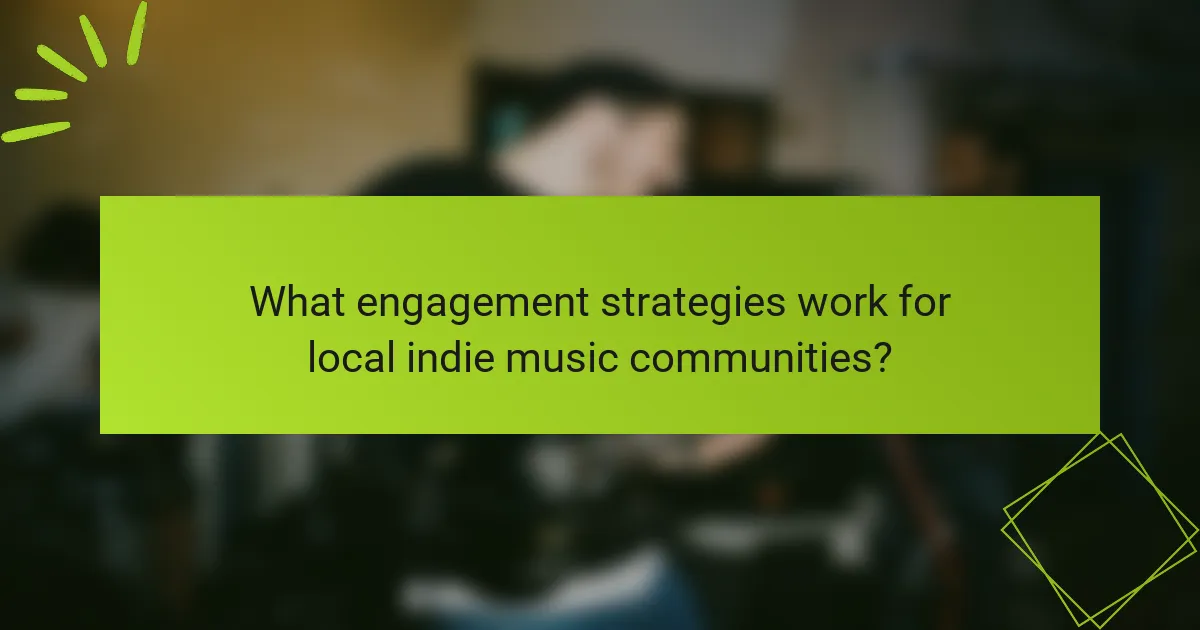
What engagement strategies work for local indie music communities?
Effective engagement strategies for local indie music communities include creating collaborative events, fostering online discussions, and leveraging merchandise and crowdfunding. These methods not only enhance community interaction but also support local artists in gaining visibility and financial backing.
Collaborative events with local artists
Collaborative events, such as open mic nights, music festivals, and artist showcases, provide platforms for local musicians to perform and connect. These gatherings encourage networking among artists and fans, fostering a sense of community. Consider organizing events in accessible venues that cater to diverse audiences, ensuring inclusivity.
To maximize participation, promote events through social media, local radio stations, and community boards. Offering incentives like free entry or merchandise discounts can attract larger crowds. Additionally, collaborating with local businesses for sponsorship can enhance the event’s reach and resources.
Online forums and discussion groups
Online forums and discussion groups serve as virtual spaces where fans and artists can share music, discuss trends, and provide feedback. Platforms like Facebook groups, Reddit, or dedicated music forums allow for ongoing engagement and community building. Regularly posting discussion topics or music challenges can keep the conversation lively and inclusive.
Encourage members to share their own music and experiences, creating a supportive environment. Moderation is key to maintaining a positive atmosphere, so establish clear guidelines for interactions. Highlighting local artists’ achievements within these groups can further strengthen community ties.
Merchandise and crowdfunding campaigns
Merchandise and crowdfunding campaigns are vital for supporting local indie artists financially. Selling branded merchandise, such as T-shirts, vinyl records, or stickers, not only generates income but also promotes the artist’s brand. Consider using platforms like Bandcamp or local markets to sell products directly to fans.
Crowdfunding campaigns on sites like Kickstarter or GoFundMe can help artists fund their projects while engaging their audience. Set clear goals and offer enticing rewards for backers, such as exclusive content or private concerts. Transparency about how funds will be used can build trust and encourage more contributions.
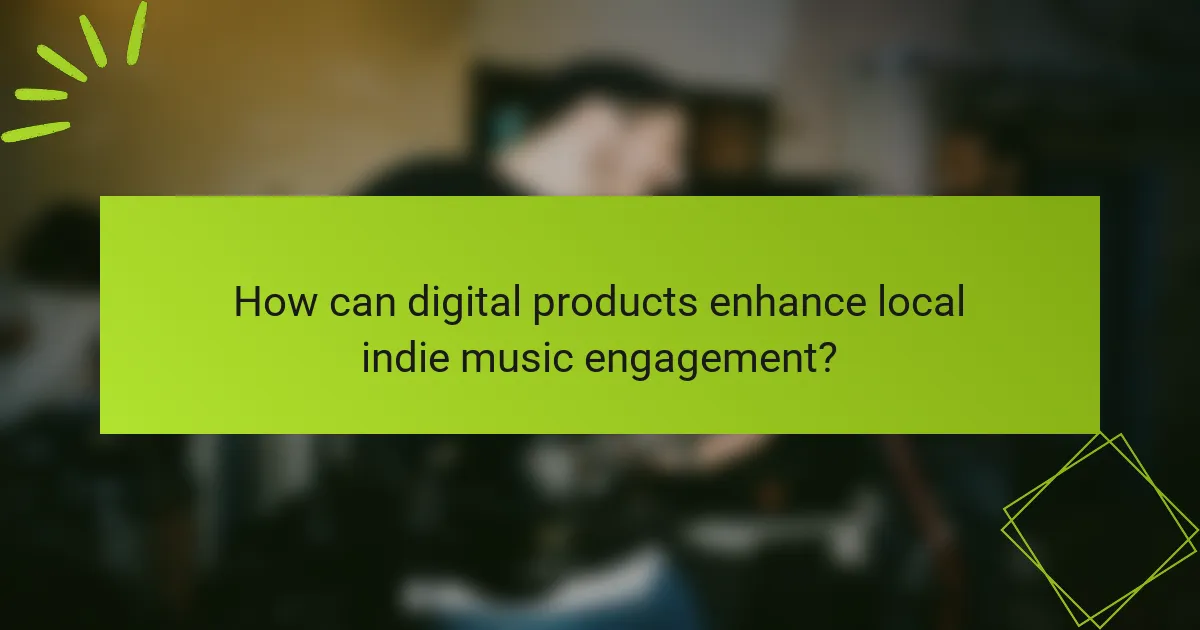
How can digital products enhance local indie music engagement?
Digital products can significantly boost local indie music engagement by providing platforms for discovery, interaction, and community building. These tools facilitate connections between artists and fans, making it easier to explore new music and participate in local scenes.
Music discovery apps
Music discovery apps are essential for finding new indie artists and tracks. These applications often use algorithms to recommend music based on user preferences, allowing listeners to explore genres and styles they may not have encountered otherwise.
Popular apps like Spotify, Bandcamp, and SoundCloud enable users to follow local artists, listen to curated playlists, and even access exclusive content. To maximize their effectiveness, users should regularly engage with the app features, such as liking songs or creating playlists, to refine recommendations.
Virtual concert platforms
Virtual concert platforms allow fans to attend live performances from the comfort of their homes, expanding access to local indie music. These platforms often include features like chat rooms for interaction and options for tipping artists, which can enhance the concert experience.
Examples include platforms like Veeps and Stageit, where artists can host live shows and connect directly with their audience. To support local musicians, fans should consider purchasing tickets for these events and sharing their experiences on social media to increase visibility.
Online fan clubs
Online fan clubs create dedicated spaces for fans to connect with each other and their favorite indie artists. These communities often provide exclusive content, such as behind-the-scenes videos, early access to tickets, and merchandise discounts.
Platforms like Patreon and Discord are popular for hosting fan clubs, where members can engage in discussions and share their love for the music. To get the most out of these communities, fans should actively participate in discussions and support artists through membership fees or donations, fostering a vibrant local music culture.
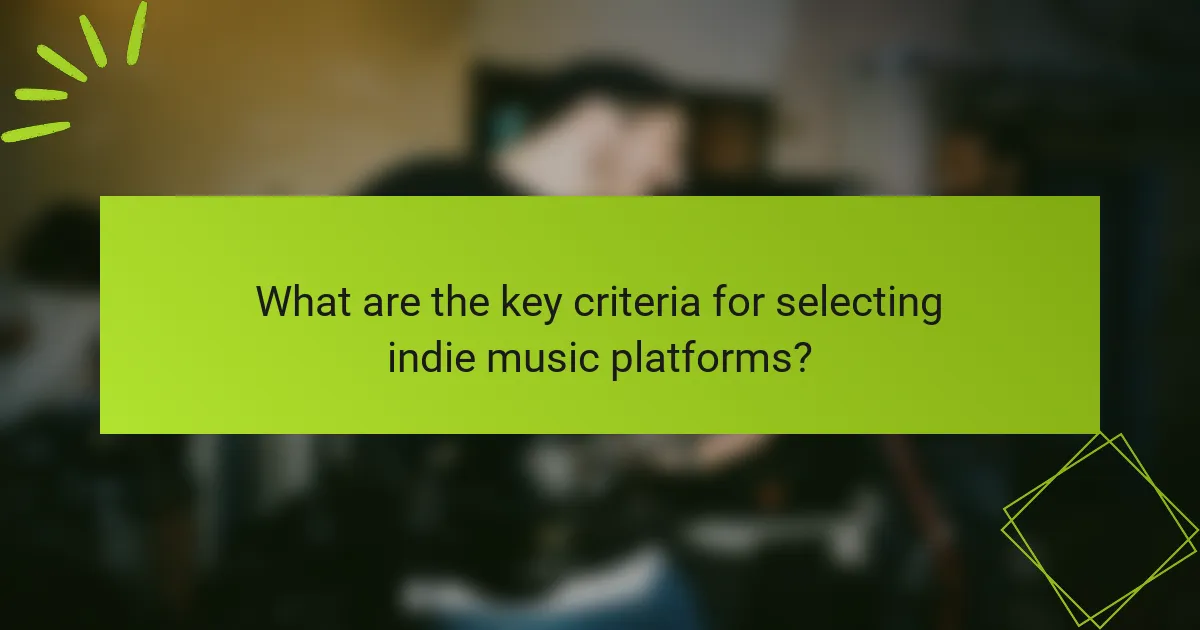
What are the key criteria for selecting indie music platforms?
When selecting indie music platforms, consider user interface, artist support features, and community-building tools. These criteria ensure a positive experience for both listeners and artists, facilitating discovery and engagement in the indie music scene.
User interface and experience
A user-friendly interface is essential for indie music platforms, as it enhances the overall listening experience. Look for platforms that offer intuitive navigation, responsive design, and visually appealing layouts. Features like easy search functions and personalized recommendations can significantly improve user engagement.
Consider platforms that provide mobile compatibility, as many users access music on their smartphones. A seamless experience across devices can lead to higher retention rates and more frequent usage.
Artist support features
Platforms should offer robust support for artists, including tools for uploading music, managing profiles, and tracking analytics. Features like royalty tracking and promotional tools can help artists effectively manage their careers. Look for platforms that provide educational resources, such as articles or webinars, to help artists grow their skills.
Additionally, consider platforms that allow for direct fan engagement through features like messaging or live streaming. This can foster a stronger connection between artists and their audience, enhancing loyalty and support.
Community-building tools
Effective community-building tools are vital for fostering a vibrant indie music scene. Look for platforms that offer forums, chat features, or social media integration to encourage interaction among users. These tools can help fans connect over shared interests and support their favorite artists.
Platforms that host events, such as virtual concerts or local meet-ups, can further strengthen community ties. Engaging users through contests or collaborative projects can also enhance participation and excitement within the indie music community.
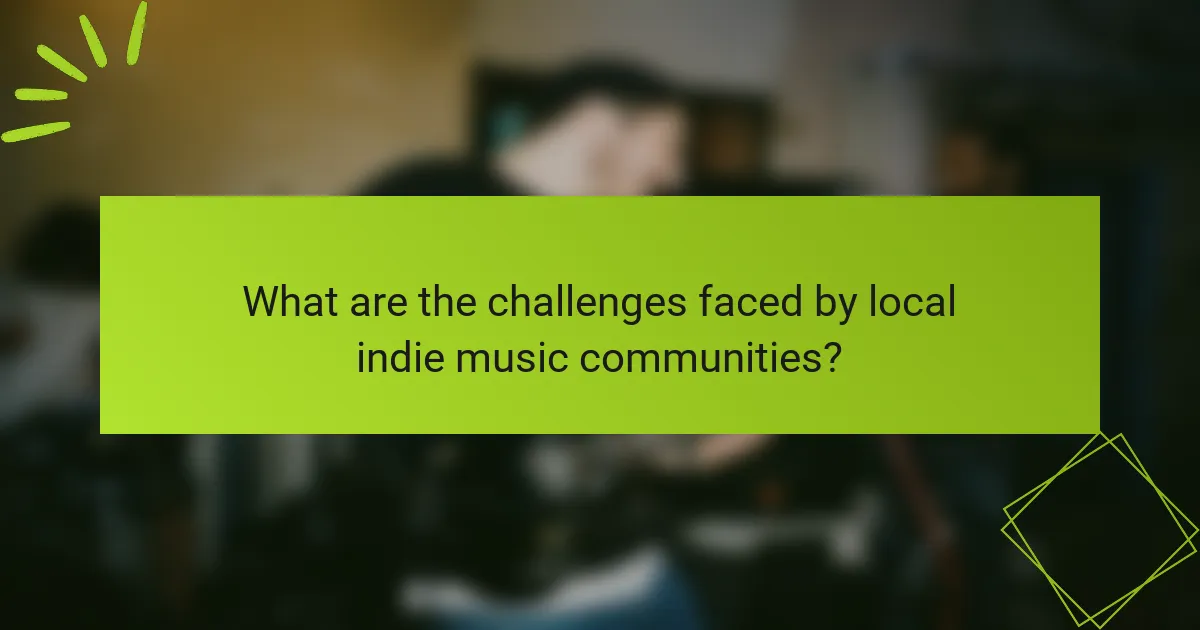
What are the challenges faced by local indie music communities?
Local indie music communities encounter several challenges that can hinder their growth and sustainability. Key issues include securing funding, gaining visibility in a saturated market, and building a dedicated audience.
Funding and financial sustainability
Securing funding is a primary challenge for local indie music communities, as many operate on tight budgets. Sources of funding can include grants, sponsorships, and crowdfunding, but these often require significant effort to obtain.
Communities should explore local arts grants, which may offer financial support for events or projects. Additionally, establishing partnerships with local businesses can provide mutual benefits, such as venue space in exchange for promotion.
Visibility in a crowded market
In a crowded music market, gaining visibility is crucial for local indie artists. Many communities struggle to stand out amidst the noise of mainstream music and larger acts.
Utilizing social media platforms effectively can enhance visibility. Engaging content, such as live performances or behind-the-scenes footage, can attract attention. Collaborating with other local artists for joint events or cross-promotions can also expand reach.
Building a loyal audience
Building a loyal audience is essential for the sustainability of local indie music communities. This requires consistent engagement and creating a sense of belonging among fans.
Regularly hosting events, such as open mic nights or community showcases, can foster connections between artists and audiences. Offering exclusive content or merchandise to loyal fans can also encourage ongoing support and deepen relationships.
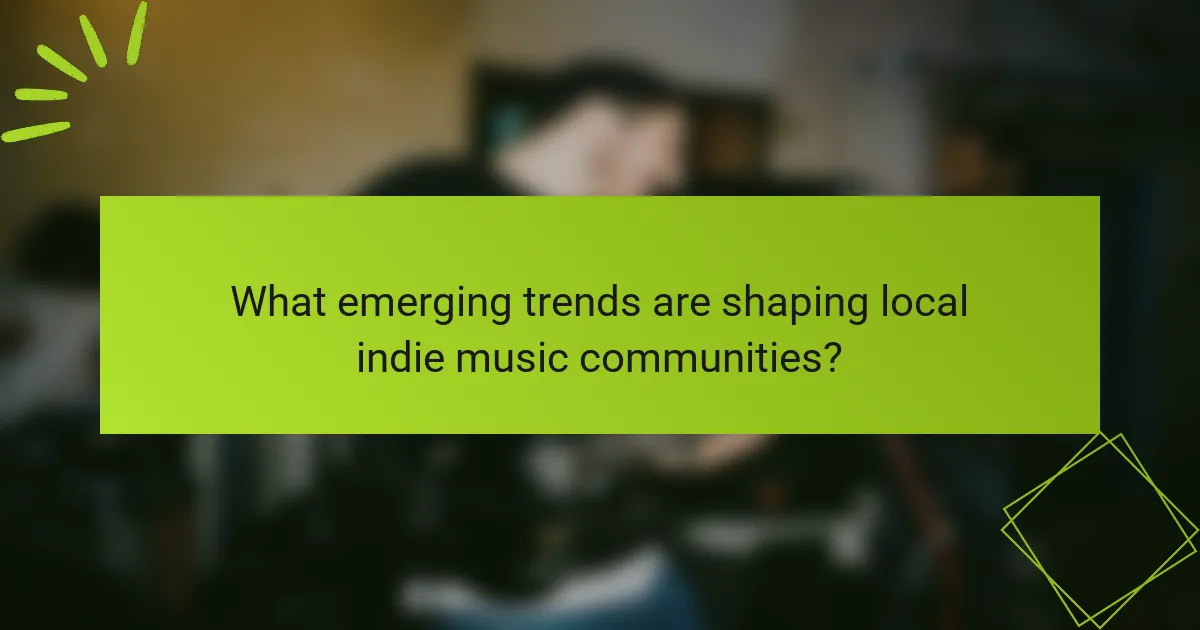
What emerging trends are shaping local indie music communities?
Local indie music communities are increasingly influenced by digital platforms, social media engagement, and a focus on sustainability. These trends facilitate discovery, foster connections, and promote local talent in innovative ways.
Digital Platforms for Discovery
Digital platforms like Bandcamp, SoundCloud, and Spotify have transformed how local indie music is discovered. Artists can upload their music directly, allowing listeners to access a diverse range of sounds without traditional gatekeeping.
Social media channels, particularly Instagram and TikTok, play a crucial role in promoting local artists. Engaging content, such as behind-the-scenes videos or live performances, can quickly go viral, helping musicians reach wider audiences.
Community Engagement through Events
Local events, such as open mics, house concerts, and music festivals, are vital for community engagement. These gatherings not only showcase local talent but also create a sense of belonging among attendees.
Collaborative events that combine music with other local arts, like visual art exhibitions or food markets, can attract diverse crowds and enhance the overall experience. Consider organizing themed nights or pop-up shows to keep the community engaged.
Sustainability and Ethical Practices
Many indie music communities are prioritizing sustainability and ethical practices. This includes using eco-friendly materials for merchandise and promoting local venues that support sustainable initiatives.
Artists and organizers can adopt practices such as digital ticketing to reduce waste or partnering with local businesses to minimize their carbon footprint. Engaging the community in these efforts can strengthen loyalty and support for local music.
